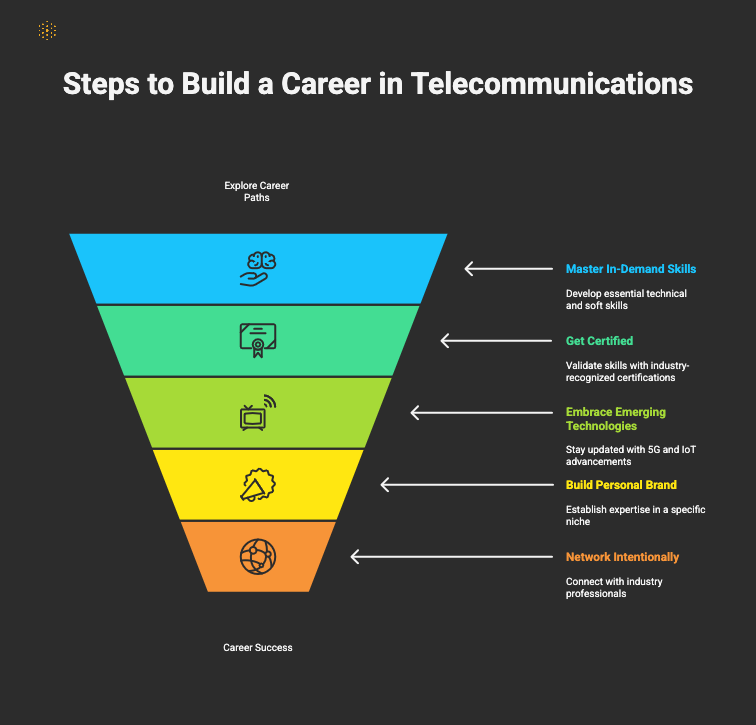How can you build a successful career in the fast-evolving telecommunications industry?
Break into telecommunications by combining technical expertise in networking, cloud, cybersecurity, and IoT with strong communication and project management skills. Earn top certifications like CCIE or CTNS, specialize in 5G or IoT niches, and build a personal brand that highlights your expertise. Active networking and contributions to open-source projects can accelerate your visibility and career growth.
The U.S. telecommunication market, spanning mobile data, voice, IoT, and more is on track to expand from $344.45 billion in 2025 to $416.26 billion by 2030.
Behind those billions lies a simple truth: demand for faster, smarter, and more secure connectivity keeps climbing, and so does the need for skilled professionals who can build, protect, and innovate within these networks.
If you’re considering a career in telecommunications, now is the time to position yourself for growth.
This guide breaks down 6 practical strategies to not only enter the industry but thrive in it - whether your path leads to 5G, IoT, cloud, or beyond.
1. Look Beyond the Obvious Roles
When you think of a career in telecommunications, you might picture a technician working on telephone lines.
While that's a vital role, the industry offers a much wider range of opportunities.
According to the U.S. Bureau of Labor Statistics, the telecommunications industry employs a diverse workforce, from customer service representatives to electronics engineers.
Here are some of the exciting career paths you can explore:
- Network Engineer: As a network engineer, you'll design, implement, and maintain the communication networks that we rely on every day. In practice, this means architecting resilient topologies (BGP, OSPF, MPLS, SD-WAN), automating configuration and monitoring with tools like Python and Ansible, optimizing bandwidth and latency, and coordinating incident response to keep services reliable and secure.
- Cybersecurity Analyst: With the rise of cyber threats, the demand for cybersecurity professionals in the telecommunications industry is booming. You'll be responsible for protecting sensitive data and ensuring the security of communication networks through methods like network segmentation, intrusion detection, and real-time monitoring.
- Cloud Engineer: As more and more telecommunication services move to the cloud, professionals with expertise in cloud technologies like AWS and Azure are in high demand.
- IoT Specialist: The Internet of Things (IoT) is connecting everything from smart homes to industrial sensors, and telecommunications professionals are needed to manage these vast networks of devices.
2. Master In-Demand Skills (Not Just the Technical Ones)
To succeed in the telecommunications industry, you need a blend of technical and soft skills. While technical expertise is crucial, don't underestimate the power of soft skills.
Top Technical Skills
- Networking: A deep understanding of networking concepts, protocols, and technologies is fundamental.
- 5G and IoT: Expertise in these emerging technologies will give you a significant competitive advantage.
- Cloud Computing: Familiarity with cloud platforms like AWS and Azure is becoming increasingly important.
- Cybersecurity: Skills in network security, threat detection, and incident response are in high demand.
Top Soft Skills
- Project Management: The ability to manage complex projects and meet deadlines is highly valued.
- Communication: You need to be able to communicate technical information clearly to both technical and non-technical audiences.
- Problem-Solving: Telecommunications professionals are constantly troubleshooting and solving complex technical issues.
When crafting your resume, make sure to highlight these resume skills to catch the eye of recruiters.

3. Get Certified to Get Ahead
Certifications are a great way to validate your skills and knowledge, and they can give you a competitive edge in the job market.
Some of the most valuable certifications for telecommunications professionals include:
- Cisco Certified Internetwork Expert (CCIE): This is one of the most respected networking certifications in the world.
- Certified Wireless Network Professional (CWNP): This certification is ideal for professionals who want to specialize in wireless networking.
- Certified Telecommunications Network Specialist (CTNS): This certification from the Telecommunications Certification Organization (TCO) provides a strong foundation in telecommunications networking.
4. Embrace the Future: 5G and IoT
5G and the Internet of Things (IoT) are revolutionizing the telecommunications industry. 5G offers significantly faster speeds and lower latency, which will enable a new wave of applications and services.
The number of connected IoT devices is expected to reach 29 billion by 2030, according to Transforma Insights.
These technologies are creating new job opportunities in areas like:
- 5G Network Deployment and Maintenance
- IoT Device Management and Security
- Development of new 5G and IoT applications
5. Build a Niche Personal Brand That Shouts Expertise
In a vast field like telecommunications, a generalist often gets overlooked. To stand out, you need to build a personal brand around a specific, in-demand niche.
Don't just be "a telecom professional"; be "the expert in 5G network slicing for industrial IoT" or "the go-to person for rural broadband deployment."
Actionable Steps
- Contribute to Open-Source Telecom Projects: Get your hands dirty and build a public portfolio of your skills. Contributing to projects like those hosted by the OpenInfra Foundation (such as StarlingX for edge computing) or projects Nokia is involved in, like Nephio, not only hones your abilities but also makes your work visible to industry leaders.
- Create a Professional Blog or Project Portfolio: Start a blog and write in-depth articles about your niche. If you’re a network engineer, document how you built a home lab. If you’re a cybersecurity analyst, analyze recent telecom-related security breaches. You can easily create a professional-looking portfolio website to showcase your work.
- Engage in High-Signal Industry Forums: Move beyond generic platforms. Participate in specialized communities where real experts congregate. This could be specific subreddits, forums hosted by the Telecommunications Industry Association (TIA), or discussions within the World Economic Forum's Information and Communication Technologies community.
6. Network with Intent, Not Just Volume
Collecting hundreds of LinkedIn connections is a vanity metric. True networking is about building meaningful relationships with the right people who can offer guidance, opportunities, and insights.
Actionable Steps
- Join and Actively Participate in Professional Associations: Don't just pay the membership fee. Join a committee, volunteer for an event, or participate in webinars. Key associations to consider are the Telecommunications Industry Association (TIA), the International Telecommunications Society (ITS), and ETIS for those focused on the European market.
- Target Your Networking Efforts: Identify 10-15 companies you'd love to work for. Find professionals in your target roles at those companies and follow their work. Engage with their posts thoughtfully before reaching out for a brief, 15-minute informational interview to learn about their experience.
- Attend Hackathons and Industry Challenges: Events like the Department of Telecommunications' 5G Innovation Hackathon are goldmines for networking. You'll not only test your skills on real-world problems but also collaborate with and impress potential future colleagues and employers in a high-pressure, hands-on environment.

Wrapping Up
The telecom industry is evolving fast, driven by 5G, IoT, and cloud; and with it, the expectations for talent are rising just as quickly.
Breaking in or moving up isn’t only about keeping your technical skills sharp; it’s about how well you present your expertise, communicate your value, and prepare for the opportunities ahead.
If you want to stand out, invest in more than just knowledge.
Build resumes that get noticed, practice interviews that build confidence, and shape a personal brand that positions you as a leader in your niche.
Hiration is designed to help you do exactly that - so when the next wave of opportunities arrives, you’re ready to lead it.
Telecommunications Career Guide — FAQ
What are the best career paths in telecommunications?
Top roles include network engineer, cybersecurity analyst, IoT specialist, and cloud engineer. Each plays a vital part in advancing next-gen connectivity, from 5G rollout to data security and smart device integration.
Which technical skills are most in demand?
Employers prioritize networking (BGP, SD-WAN), 5G, IoT, cloud computing (AWS, Azure), and cybersecurity. Adding automation skills in Python or Ansible gives a strong competitive edge.
Are soft skills important in telecommunications?
Yes. Strong communication, teamwork, and project management skills are critical, especially when explaining technical concepts or coordinating across engineering and operations teams.
Which certifications can boost my telecom career?
Highly valued certifications include CCIE, CWNP, and CTNS. They validate your technical expertise and can significantly increase your job prospects and salary potential.
Why should I focus on 5G and IoT?
5G and IoT are transforming telecommunications with massive connectivity, low latency, and automation opportunities. Mastering these technologies positions you at the forefront of industry innovation.
How can I stand out in such a competitive field?
Develop a niche personal brand—specialize in areas like 5G security or IoT integration. Share your insights through blogs, open-source contributions, and industry discussions to demonstrate expertise.
What’s the best way to build industry connections?
Engage in professional associations such as TIA or ITS, attend hackathons and telecom conferences, and participate in niche technical forums or community-led projects to grow meaningful relationships.
Is telecom still a good long-term career?
Absolutely. With the U.S. telecom market projected to reach over $416 billion by 2030 and the rise of 5G, IoT, and cloud infrastructure, demand for skilled professionals will remain strong for years ahead.



